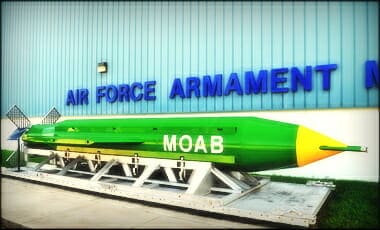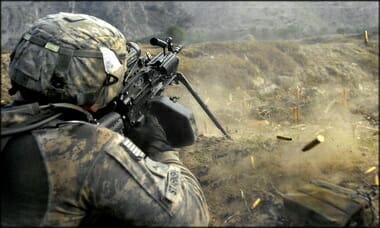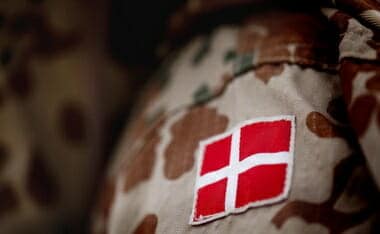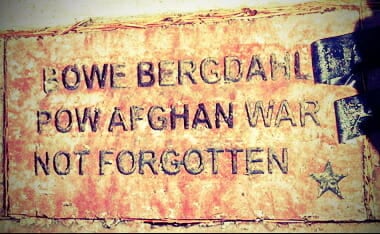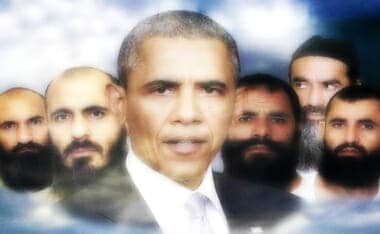
Politicians and leaders from both sides of the aisle make mention of this myth that we funded/created Al Qaeda via weapons, training, and money to the likes of Osama Bin Laden. The Daily Caller in 2013 notes some of the positions:
…in just a one-month span, Sen. Paul has — not once, but twice — advanced a conspiracy theory that says that during the Reagan era, the U.S. funded Osama bin Laden.
During John Kerry’s secretary of state confirmation hearing, Paul said ”We funded bin Laden” — a statement that prompted Foreign Policy magazine’s managing editor, Blake Hounshell, to fire off a tweet saying: “Rand Paul tells a complete falsehood: ‘We funded Bin Laden.’ This man is on the Senate Foreign Relations Committee.”
But that didn’t discourage Paul. During a much anticipated foreign policy speech at the Heritage Foundation today, Paul doubled down, saying: “In the 1980’s the war caucus in Congress armed bin Laden and the mujaheddin in their fight with the Soviet Union.”
The only problem is that this is, at best, highly speculative — and, at worst, the perpetuation of an outright myth.
This also puts Paul in the same camp as Michael Moore, who said: ““WE created the monster known as Osama bin Laden! Where did he go to terrorist school? At the CIA!”….
And, this is the crux of the matter: truthers took Michael Moore’s non-evidential presentations and statements and ran with them.
Another example that shows this myth isn’t necessarily one owned by strictly by politicians, as, this conversation on a friends FaceBook shows:
Antony: failed foreign policy means today’s buddies are tomorrows boogiemen.
Hunlsy: I just love the fact they’re fighting us with the weapons and training that we gave them.
Antony: Oh where oh where did Iran get those P3s and F-14 Tomcats?
Antony: it was the US – we used to be buddies with Iranians too. We played both sides of the Iran/Iraq war, which predicated Gulf I.
Hunsly: Likely from the Russians. Regardless, we’re fighting a group, not a country. This group makes all of its IEDs & buys all of their weapons with the money that we gave them.
Here is my short intercept of the above conversation. More info will follow it:
Weapons
This is somewhat of a myth — that we sold the majority of weapons to the Taliban, to Iraq, and the like. For instance, in the following graph you can see that (in the instance of Iraq, which I was told over-and-over-again was weaponized by the U.S.) you have to combine the U.K. and the U.S. to equal 1%.
Moral Position
Much like us supporting Stalin in defeating Hitler, we were aligned with people whom we didn’t see eye-to-eye with in order to beat the USSR during the Cold War (WWIII)… a war that was fought from 1947–1991.
History
And thirdly, the Taliban didn’t exist when Reagan said this:
Reagan didn’t say that about the Taliban because the Taliban didn’t exist yet. He said that of the Mujahedin, the same men who would later go on to fight the Taliban under the name “Northern Alliance”
The Afghan Northern Alliance, officially known as the United Islamic Front for the Salvation of Afghanistan (Persian: جبهه متحد اسلامی ملی برای نجات افغانستان Jabha-yi Muttahid-i Islāmi-yi Millī barā-yi Nijāt-i Afghānistān), was a military front that came to formation in late 1996 after the Islamic Emirate of Afghanistan (Taliban) took over Kabul. The United Front was assembled by key leaders of the Islamic State of Afghanistan, particularly president in exile Burhanuddin Rabbani and former Defense Minister Ahmad Shah Massoud. Initially it included mostly Tajiks but by 2000, leaders of other ethnic groups had joined the Northern Alliance. This included Abdul Rashid Dostum, Mohammad Mohaqiq, Abdul Qadir, Sayed Hussein Anwari and others.
The Northern Alliance fought a defensive war against the Taliban government. They received support from Iran, Russia, India, Tajikistan and others, while the Taliban were backed by al-Qaeda. The Northern Alliance was mostly made up of ethnic Tajiks, but later included Uzbeks, Hazaras, and Pashtuns. The Taliban government was dominated by Pashtuns with other groups being the minority. After the US-led invasion and establishment of the Karzai administration in late 2001, the Northern Alliance broke apart and different political parties were formed.
The mujaheddin fighters who had previously defeated the communist government and formed the Islamic State of Afghanistan (ISA) came under attack and in 1996 lost the capital to the Taliban. At this juncture the Mujahedin resorted to the creation of UIF because Rashid Dostum and other warlords who belonged to various tribes but to no specific political party did not want to recognize the ISA as a legal entity, so the defeated government devised a military strategy to utilize these forces while not offending their political sensibilities.
In October 1996 in Khinjan, Ahmed Shah Massoud and Dostum came to an agreement to form the anti-Taliban coalition that outside Afghanistan became known as the Northern Alliance.
CNN was doing a special on Afghanistan and Peter Bergen asked for questions from viewers that he would answer. One of the questions is as follows:
- “If it’s true that bin Laden once worked for the CIA, what makes you so sure that he isn’t still?” ~ Anne Busigin, Toronto, Canada
Peter Bergen responds:
This is one of those things where you cannot put it out of its misery.
The story about bin Laden and the CIA — that the CIA funded bin Laden or trained bin Laden — is simply a folk myth. There’s no evidence of this. In fact, there are very few things that bin Laden, Ayman al-Zawahiri and the U.S. government agree on. They all agree that they didn’t have a relationship in the 1980s. And they wouldn’t have needed to. Bin Laden had his own money, he was anti-American and he was operating secretly and independently.
The real story here is the CIA didn’t really have a clue about who this guy was until 1996 when they set up a unit to really start tracking him.
One person in a forum that was similarly challenged pointed out that this surely wasn’t the Taliban because they hated women in any position of authority — look at the pic at the top again.
As you read on, keep in mind Mr. Bergen was not a fan of conservatives, or Republicans. With that in mind, enjoy the rest, it is posted here so it will never disappear on me:
U.S. government officials and a number of other parties maintain that the U.S. supported only the indigenous Afghan mujahideen. They deny that the CIA or other American officials had contact with the Afghan Arabs (foreign mujahideen) or Bin Laden, let alone armed, trained, coached or indoctrinated them. Scholars and reporters have called the idea of CIA-backed Afghan Arabs (foreign mujahideen) “nonsense”,[6] “sheer fantasy”, and “simply a folk myth.”
They argue that:
- with a quarter of a million local Afghans willing to fight there was no need to recruit foreigners unfamiliar with the local language, customs or lay of the land
- with several hundred million dollars a year in funding from non-American, Muslim sources, Arab Afghans themselves would have no need for American funds
- Americans could not train mujahideen because Pakistani officials would not allow more than a handful of U.S. agents to operate in Pakistan and none in Afghanistan;
- the Afghan Arabs were militant Islamists, reflexively hostile to Westerners, and prone to threaten or attack Westerners even though they knew the Westerners were helping the mujahideen.
Al-Qaeda leader Ayman al-Zawahiri says much the same thing in his book Knights Under the Prophet’s Banner.
Bin Laden himself once said “the collapse of the Soviet Union … goes to God and the mujahideen in Afghanistan … the US had no mentionable role,” but “collapse made the US more haughty and arrogant.”
According to CNN journalist Peter Bergen, known for conducting the first television interview with Osama bin Laden in 1997,
The story about bin Laden and the CIA — that the CIA funded bin Laden or trained bin Laden — is simply a folk myth. There’s no evidence of this. In fact, there are very few things that bin Laden, Ayman al-Zawahiri and the U.S. government agree on. They all agree that they didn’t have a relationship in the 1980s. And they wouldn’t have needed to. Bin Laden had his own money, he was anti-American and he was operating secretly and independently. The real story here is the CIA did not understand who Osama was until 1996, when they set up a unit to really start tracking him.
Bergen quotes Pakistani Brigadier Mohammad Yousaf, who ran the Inter-Services Intelligence (ISI) Afghan operation between 1983 and 1987:
It was always galling to the Americans, and I can understand their point of view, that although they paid the piper they could not call the tune. The CIA supported the mujahideen by spending the taxpayers’ money, billions of dollars of it over the years, on buying arms, ammunition, and equipment. It was their secret arms procurement branch that was kept busy. It was, however, a cardinal rule of Pakistan’s policy that no Americans ever become involved with the distribution of funds or arms once they arrived in the country. No Americans ever trained or had direct contact with the mujahideen, and no American official ever went inside Afghanistan.
Marc Sageman, a Foreign Service Officer who was based in Islamabad from 1987–1989, and worked closely with Afghanistan’s Mujahideen, argues that no American money went to the foreign volunteers.
Sageman also says:
Contemporaneous accounts of the war do not even mention [the Afghan Arabs]. Many were not serious about the war. … Very few were involved in actual fighting. For most of the war, they were scattered among the Afghan groups associated with the four Afghan fundamentalist parties.
No U.S. official ever came in contact with the foreign volunteers. They simply traveled in different circles and never crossed U.S. radar screens. They had their own sources of money and their own contacts with the Pakistanis, official Saudis, and other Muslim supporters, and they made their own deals with the various Afghan resistance leaders.”[14]
Vincent Cannistraro, who led the Reagan administration’s Afghan Working Group from 1985 to 1987, puts it,
The CIA was very reluctant to be involved at all. They thought it would end up with them being blamed, like in Guatemala.” So the Agency tried to avoid direct involvement in the war, … the skittish CIA, Cannistraro estimates, had less than ten operatives acting as America’s eyes and ears in the region. Milton Bearden, the Agency’s chief field operative in the war effort, has insisted that “[T]he CIA had nothing to do with” bin Laden. Cannistraro says that when he coordinated Afghan policy from Washington, he never once heard bin Laden’s name.
Fox News reporter Richard Miniter wrote that in interviews with the two men who “oversaw the disbursement for all American funds to the anti-Soviet resistance, Bill Peikney – CIA station chief in Islamabad from 1984 to 1986 – and Milt Bearden – CIA station chief from 1986 to 1989 – he found,
Both flatly denied that any CIA funds ever went to bin Laden. They felt so strongly about this point that they agreed to go on the record, an unusual move by normally reticent intelligence officers. Mr. Peikney added in an e-mail to me: “I don’t even recall UBL [bin Laden] coming across my screen when I was there.
Other reasons advanced for a lack of a CIA-Afghan Arab connection of “pivotal importance,” (or even any connection at all), was that the Afghan Arabs themselves were not important in the war but were a “curious sideshow to the real fighting.”
One estimate of the number of combatants in the war is that 250,000 Afghans fought 125,000 Soviet troops, but only 2000 Arab Afghans fought “at any one time”.
According to Milton Bearden the CIA did not recruit Arabs because there were hundreds of thousands of Afghans all too willing to fight. The Arab Afghans were not only superfluous but “disruptive,” angering local Afghans with their more-Muslim-than-thou attitude, according to Peter Jouvenal. Veteran Afghan cameraman Peter Jouvenal quotes an Afghan mujahideen as saying “whenever we had a problem with one of them [foreign mujahideen], we just shot them. They thought they were kings.”
Many who traveled in Afghanistan, including Olivier Roy[20] and Peter Jouvenal, reported of the Arab Afghans’ visceral hostility to Westerners in Afghanistan to aid Afghans or report on their plight. BBC reporter John Simpson tells the story of running into Osama bin Laden in 1989, and with neither knowing who the other was, bin Laden attempting to bribe Simpson’s Afghan driver $500 — a large sum in a poor country — to kill the infidel Simpson. When the driver declined, Bin Laden retired to his “camp bed” and wept “in frustration.”
According to Steve Coll, author of “Ghost Wars”, the primary contact for the CIA and ISI in Afghanistan was Ahmed Shah Massoud a poppy farmer and militia leader known as the “Lion of the Panjeer”. During the Afghan Civil War which erupted once the Soviets had left, Massoud’s army was routed by the Taliban (who were being helped by Pakistan’s ISI) and restricted to the northern region of the country. A loose entente was formed with several other native tribal militias which became known as the Northern Alliance who operated in opposition to the Taliban. On September 10, 2001 a camera crew was granted access to Massoud under the premise they were interviewing him for a documentary about the Mujahadeen. The crew members were actually Al Qaeda operatives who detonated a bomb killing themselves and Massoud. The purpose of the assassination was to eliminate a key ally for the US in anticipation of an invasion in retaliation for the 9/11 attacks which were to take place the following day.
And here is another great post responding to the non-evidential/conspiratorial [leftists] on the subject:
“Osama bin Laden was trained and funded by the CIA” – you’ll read the claim everywhere, and it’s rarely opposed: everyone just seems to accept that it’s true. But why? How much evidence have you ever seen presented to support this?
The reality is that there are many people who say this is simply a myth. And we’re not just talking about neo-con friendly journalists, either.
Take Jason Burke, for instance, a major contributor to the BBC documentary “The Power of Nightmares”. In his book “Al Qaeda”, he wrote the following:
It is often said that bin Ladin was funded by the CIA. This is not true, and indeed it would have been impossible given the structure of funding that General Zia ul-Haq, who had taken power in Pakistan in 1977, had set up. A condition of Zia’s cooperation with the American plan to turn Afghanistan into the Soviet’s ‘Vietnam’ was that all American funding to the Afghan resistance had to be channeled through the Pakistani government, which effectively meant the Afghan bureau of the Inter Services Intelligence (ISI), the military spy agency. The American funding, which went exclusively to the Afghan mujahideen groups, not the Arab volunteers [bin Ladin’s groups], was supplemented by Saudi government money and huge funds raised from mosques, non-governmental charitable institutions and private donors throughout the Islamic world. Most of the major Gulf-based charities operating today were founded at this time to raise money or channel government funds to the Afghans, civilians and fighters. In fact, as little as 25 per cent of the monet for the Afghan jihad was actually supplied directly by states.
Page 59, Al Qaeda: The true story of radical Islam, Jason Burke
Steve Coll, former Managing Editor of the Washington Post, also suggests bin Ladin passed largely unnoticed by the CIA, in his book “Ghost Wars: The Secret History of the CIA, Afghanistan, and bin Laden, from the Soviet Invasion to September 10, 2001”:
…According to [Ahemd] Badeeb, on bin Ladin’s first trip to Pakistan he brought donations to the Lahore offices of Jamaat-e-Islami, Zia’s political shock force. Jamaat was the Pakistani offshoot of the Muslim Brotherhood; its students had sacked the US embassy in Islamabad in 1979. bin Ladin did not trust the official Pakistan intelligence service, Badeeb recalled, and preferred to fund his initial charity through private religious and political networks.From the beginning of the Afghan jihad, Saudi intelligence used religious charities to support its own unilateral operations. This mainly involved funneling money and equipment to favoured Afghan commanders outisde ISI or CIA control… “The humanitarian aid-that was completely separate from the Americans”, Badeeb recalled. “And we insist[ed] that the Americans will not get to that, get involved–especially in the beginning,” in part because some of the Islamist mujahedin objected to direct contact with Western infidels…
In spy lexicon, each of the major intelligence agencies began working the Afghan jihad–GID [General Intelligence Department, Saudi Arabia], ISI and the CIA– began to “compartment” their work, even as all three collaborated with one another through formal liasons…
bin Ladin moved within Saudi intelligence’s compartmented operations, outside of CIA eyesight…
Page 86/ 87, Ghost Wars, Stevel Coll
In a Q&A session following the release of his book, Coll said:
Wheaton, Md.: There have been accusations from the left that have directly accused the CIA of funding and training bin Laden. Is there any truth to this ? Steve Coll: I did not discover any evidence of direct contact between CIA officers and bin Laden during the 1980s, when they were working more or less in common cause against the Soviets. CIA officials, including Tenet, have denied under oath that such contact took place. The CIA was certainly aware of bin Laden’s activities, beginning in the mid- to late-1980s, and they generally looked favorably on what he was doing at that time. But bin Laden’s direct contacts were with Saudi intelligence and to some extent Pakistani intelligence, not with the Americans.
Peter Bergen expanded on the supposed CIA/ bin Ladin links in his book, Holy War Inc:
But were the CIA and the Afghan Arabs in cahoots, as recent studies have suggested? One author charges: “The CIA had funded and trained the Afghan Arabs during the war”. Another refers to “the central role of the CIA’s Muslim mercenaries, including upwards of 2,000 mercenaries in the Afghanistan war”. Both authors present these claims as axioms, but provide no real corroboration.Other commentators have reported that bin Ladin himself was aided by the CIA. A report in the respected British newspaper The Guardian states: “In 1986 the CIA even helped him [bin Ladin] build an underground camp at Khost [Afghanistan] where he was to train recruits from across the Islamic world in the revolutionary art of jihad”…Bin Ladin, meanwhile, had expoused anti-American positions since 1982, and thanks to the fortune derived from his family’s giant construction business had little need of CIA money. In fact, the underground camp at Khost was built in 1982 by an Afghan commander, with Arab funding.
A source familiar with bin Ladin’s organisation explains that bin Ladin “never had any relations with America or American officials… He was saying very early in the 1980’s that the next battle is going to be with America… No aid or training or other support have ever been given to bin Ladin from Americans.” A senior offical unequivocally says that “bin Ladin never met with the CIA.”
While the charges that the CIA was responsible for the rise of the Afghan Arabs might make good copy, they don’t make good history. The truth is more complicated, tinged with varying shades of grey. The United States wanted to be able to deny that the CIA was funding the Afghan war, so its support was funneled through Pakistan’s military intelligence agency, Inter Services Intelligence agency (ISI). ISI in turn made the decisions about which Afghan factions to arm and train, tending to fund the most Islamist and pro-Pakistan. The Afghan Arabs generally fought alongside those factions, which is how the charge arose that they were creatures of the CIA.
Former CIA officer Milt Bearden, who ran the Agency’s Afghan operation in the late 1980’s, says: “The CIA did not recruit Arabs,” as there was no need to do so. There were hundreds of thousands of Afghans all too willing to fight…
Moreover, the Afghan Arabs demonstrated a pathological dislike of Westerners. Jouvenal says: “I always kept away from Arabs [in Afghanistan]. They were very hostile. They would ask, ‘What are you doing in an Islamic country?” The BBC reporter John Simpson had a close call with bin Ladin himself outside Jalalabad in 1989. Travelling with a group of Arab mujahideen, Simpson and his television crew bumped into an Arab man beautifully dressed in spotless white robes; the man began shouting at Simpson’s escorts to kill the infidels, then offered a truck driver the not unreasonable sum of five hundred dollars to do the job. Simpson’s Afghan escort turned down the request, and bin Ladin was to be found later on a camp bed, weeping in frustration. Only when bin Ladin became a public figure, almost a decade later, did Simpson realise who the mysterious Arab was who had wanted him dead.
Page 67/68, Holy War Inc, Peter Bergen
This level of hostility to Westerners doesn’t suggest a warm working relationship with the US, and there’s some confirmation in a story retold by Richard Miniter:
…the handful of Americans who had heard of bin Ladin in the 1980’s knew him mainly for his violently anti-American views. Dana Rohrabacher, now a Republican congressman from Orange County, California, told me about a trip he took with the mujihideen in 1987. At the time, Rohrabacher was a Reagan aide who delighted in taking long overland trips inside Afghanistan with anti-Communist forces. On one such trek, his guide told him not to speak English for the next few hours because they were passing by bin Ladin’s encampment. Rohrabacher was told, “If he hears an American, he will kill you.”
Page 16, Disinformation, Richard Miniter
Bin Ladin was himself asked about US funding by Robert Fisk:
Fisk: …what of the Arab mujahedin he took to Afghanistan – members of a guerilla army who were also encouraged and armed by the United States – and who were forgotten when that war was over? bin Ladin: “Personally neither I nor my brothers saw evidence of American help…
And Ayman al-Zawahiri, second-in-command of al Qaeda, explains more in his text “Knights under the Prophet’s Banner”. Here he claims the “Afghan Arabs” had plenty of funding from various Arab sources, and points to other indications that they never supported the US:
“While the United States backed Pakistan and the mujahidin factions with money and equipment, the young Arab mujahidin’s relationship with the United States was totally different.”Indeed the presence of those young Arab Afghans in Afghanistan and their increasing numbers represented a failure of US policy and new proof of the famous US political stupidity. The financing of the activities of the Arab mujahidin in Afghanistan came from aid sent to Afghanistan by popular organizations. It was substantial aid. “The Arab mujahidin did not confine themselves to financing their own jihad but also carried Muslim donations to the Afghan mujahidin themselves. Usama Bin Ladin has apprised me of the size of the popular Arab support for the Afghan mujahidin that amounted, according to his sources, to $200 million in the form of military aid alone in 10 years.
Imagine how much aid was sent by popular Arab organizations in the non-military fields such as medicine and health, education and vocational training, food, and social assistance (including sponsorship of orphans, widows, and the war handicapped. Add to all this the donations that were sent on special occasions such as Id al-Fitr and Id al-Adha feasts and during the month of Ramadan.”
“Through this unofficial popular support, the Arab mujahidin established training centers and centers for the call to the faith. They formed fronts that trained and equipped thousands of Arab mujahidin and provided them with living expenses, housing, travel, and organization.”
Changing Bin Ladin’s Guard
About the Afghan Arabs’ relationship with the United States, Al-Zawahiri says in his book: “If the Arab mujahidin are mercenaries of the United States who rebelled against it as it alleges, why is it unable to buy them back now? Are they not counted now-with Usama Bin Ladin at their head-as the primary threat to US interests? Is not buying them more economical and less costly that the astronomical budgets that the United States is allotting for security and defense?”
“The Americans, in their usual custom of exaggeration and superficiality, are trying to sell off illusions to the people and are ignoring the most basic facts. Is it possible that Usama Bin Ladin who, in his lectures in the year 1987, called for boycotting US goods as a form of support for the intifadah in Palestine, a US agent in Afghanistan?….
“Furthermore, is it possible that the martyr-as we regard him-Abdallah Azzam was a US collaborator when in fact he never stopped inciting young men against the United States and used to back HAMAS with all the resources at his disposal?
“Is it possible that the jihadist movement in Egypt can be a collaborator movement for the United States when Khalid al-Islambuli and his comrades killed Anwar al-Sadat, even before the phenomenon of the Arab mujahidin in Afghanistan emerged?”
“Is it possible that the jihadist movement in Egypt can be a US collaborator movement when in fact it brought up its children, ever since the movement started, to reject Israel and all the agreements of capitulation to it and to consider making peace with Israel as a contravention of Islamic Shari’ah?”
Book, His Own Words: A Translation of the Writings of Dr. Ayman Al Zawahiri
Richard Miniter has a little more on this in “Dispelling the CIA-Bin Ladin Myth“, and while you may not exactly trust the source, there were further comments worth at least a look on the US State Departments “Identifying Misinformation” site.


